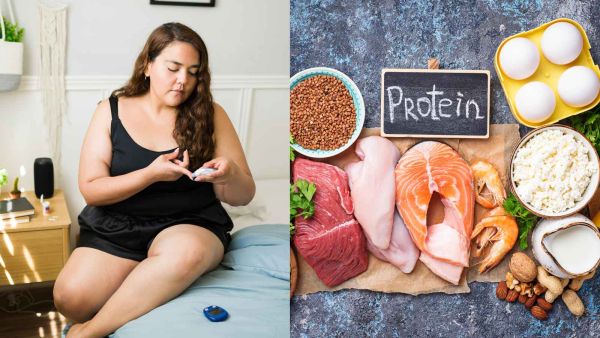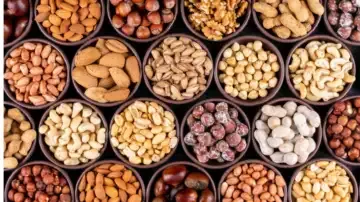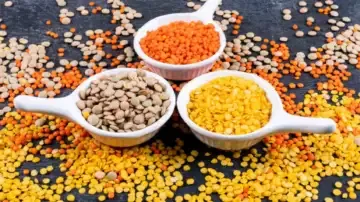
Diabetes is a growing concern, and India is ranked second in the world for the number of people with the condition. Shockingly, one in six adults with diabetes, globally, is from India.
While diabetes has no cure, it needs to be managed well. If left untreated, diabetes can cause serious problems like damage to the eyes, kidneys, and nerves. Including the right foods to your diet is an effective way to manage the condition and reduce risks. Daily consumption of these protein-rich foods for diabetics can make a big difference. Wondering why protein? Read on to know the answer.
Benefits of protein-rich foods for diabetics
People with diabetes should consume as much protein as those without the condition. Protein is one of the three essential macronutrients needed by our bodies and plays several vital roles in daily life. Adding protein-rich foods to your diet can be an easy way of filling up on this nutrient. According to a study published in the American Journal of Clinical Nutrition, increasing protein intake can help regulate blood glucose levels and lower HbA1c. Protein enhances insulin response without causing blood glucose spikes.
Additionally, research from Weill Cornell Medical College found that consuming vegetables and protein before carbohydrates or starch resulted in 29 percent, 37 percent, and 17 percent lower glucose levels at 30, 60, and 120 minutes, respectively, compared to when carbohydrates were eaten first.
Protein also plays a crucial role in boosting immunity, which is often compromised in people with diabetes. So, make sure you are adding these protein-rich foods for diabetics to your regular diet.
12 protein-rich foods for diabetics
Here are 12 protein-rich foods for diabetics that can help you manage your blood sugar levels and manage diabetes:
1. Dry fruits and spreads
Dry fruits and nut butters are some of the best protein-rich foods for diabetics that also contain healthy fats. As per the Review of Diabetic Studies, pistachios, for example, are not only high in protein but also rich in antioxidants, which can help protect against oxidative stress and control glycemic index, common issues in people with diabetes. Almond, cashew, and peanut butter provide a creamy and flavourful way to increase protein intake. However, when choosing nut butter, it is crucial to select options without added sugars or unhealthy trans fats.
 Dr fruits are good for people with diabetes. Image courtesy: Adobe Stock
Dr fruits are good for people with diabetes. Image courtesy: Adobe Stock
2. Seeds
Seeds such as chia, flax, pumpkin, and sunflower are protein-rich foods for diabetics. These are rich in omega-3 fatty acids, which can improve heart health and reduce inflammation. Chia seeds are packed with fibre, and complete protein and are a great source of all nine essential amino acids. This can help regulate blood sugar and support digestive health, according to a study published in Diabetes and Metabolic Syndrome. Enjoy it in smoothies, yoghurt, or salads.
3. Lentils
Lentils, such as brown, green, and yellow, are a nutritional powerhouse and a perfect choice for anyone with diabetes. Packed with protein, lentils can help lower blood sugar and insulin levels after eating, making them the perfect protein-rich foods for diabetics. A study published in Nutrients reveals that people who ate meals with lentils instead of rice or potatoes saw a 20-30 percent decrease in blood glucose levels.
4. Fish and seafood
Fish, particularly fatty fish like salmon, mackerel, and sardines, is a rich source of high-quality protein and heart-healthy omega-3 fatty acids. These omega-3s can help reduce insulin resistance and inflammation and lower the risk of cardiovascular diseases, which people with diabetes are more prone to. Fish is one of the most important protein-rich foods for diabetics as it is also low in carbohydrates.
5. Beans (Black, Kidney)
Beans, such as black and kidney beans, are an excellent source of plant-based protein and fibre, making them ideal for managing diabetes. The combination of protein-rich foods for diabetics and fibre helps to slow down the digestion of carbohydrates, preventing rapid spikes in blood sugar levels. Beans are also rich in antioxidants that combat the chronic inflammation often linked with diabetes.
6. Peas
Peas, such as black-eyed and split peas, are another protein-rich foods for diabetics that is often overlooked. These legumes are also high in fibre, which helps improve blood sugar control and supports healthy digestion. Include it in soups, stews, or salads to manage your diabetes.
 Peas can help you manage your blood sugar levels. Image courtesy: Freepik
Peas can help you manage your blood sugar levels. Image courtesy: Freepik
7. Chicken and turkey
Chicken and turkey, especially without the skin, are excellent sources of lean protein. Skinless poultry is lower in saturated fat and cholesterol, which can help manage diabetes-related heart health risks. breast provides about 20-25 grams of protein. Incorporating poultry into meals can help maintain muscle mass and provide lasting energy without significantly impacting blood sugar levels.
8. Eggs
Egg is one of the most important protein-rich foods for diabetics. A large egg provides 6-7 grams of high-quality protein, plus essential nutrients like B12, selenium, and vitamin D. Due to their protein and low carbs, eggs typically do not impact blood sugar, explains a study in Nutrients. However, since eggs are often fried or paired with fried foods and meats, they are linked to diabetes risk. So, eat boiled eggs to reduce the risk.
9. Cottage cheese
Cottage cheese is one of the most effective protein-rich foods for diabetics. that is also low in carbohydrates, making it excellent for diabetics. It contains casein, a slow-digesting protein that can provide a steady release of amino acids, and control hunger, preventing blood sugar spikes.
10. Soy products
Soy-based foods such as tofu, tempeh, and edamame are rich in plant-based protein and are often included in vegetarian or vegan diets. These protein-rich foods for diabetics are complete protein, meaning they provide all nine essential amino acids that the body cannot produce on its own. While edamame can be eaten as a snack, added to salads, or tossed into stir-fries, tofu, and tempeh can be used in a wide range of dishes, from smoothies to stir-fries.
11. Sweet potato
This is a nutritious, starchy vegetable that is higher in protein than regular potatoes. According to the US Department of Agriculture, one large (180 grams) sweet potato provides around 3.6 grams of protein, along with vitamins A and C, fibre, and antioxidants. These nutrients can help regulate blood sugar levels, making them one of the best protein-rich foods for diabetes. They can be roasted, mashed, or added to soups for a hearty meal.
12. Quinoa
Quinoa is a whole grain that contains a complete protein profile, meaning it has all nine essential amino acids, making it one of the best protein-rich foods for diabetics. It is also gluten-free, which makes it suitable for individuals with gluten intolerance or celiac disease. A study in the Journal of the American College of Surgeons found that higher plasma amino acids, especially leucine, lower glucose levels. Quinoa works well in salads, side dishes, or grain bowls.
 Cook quinoa the right way and eat your way to good health! Image courtesy: Adobe Stock
Cook quinoa the right way and eat your way to good health! Image courtesy: Adobe Stock
How much protein should you consume in a day?
The recommended dietary allowance (RDA) for protein is 0.8 grams per kilogram of body weight (or 0.36 grams per pound), as per Harvard Health Publishing. This amount is the minimum required to meet basic nutritional needs to prevent deficiency and protect yourself from getting sick. In a healthy diet and, as long as your kidneys are healthy, about 10 to 35 percent of your daily calories should come from protein, which is the same recommendation for individuals with diabetes as well. According to Harvard Health Publishing, protein needs increase during pregnancy, with experts recommending 75 to 100 grams per day to support fetal development and the growing placenta, breasts, and blood supply. It is important to consult with your doctor to determine your specific protein requirements.